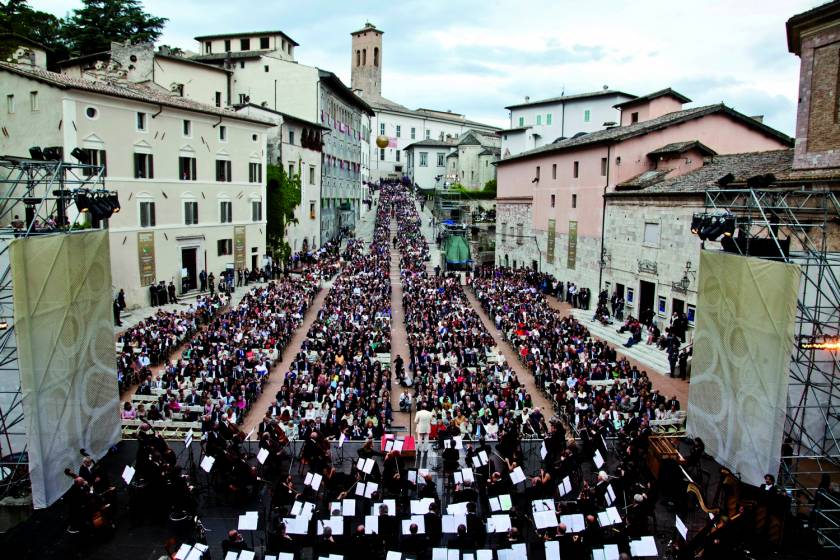Because those who came to Spoleto yesterday did not find a single inaugural show in front of them (as per the tradition of more than ten years), but six of them, all more or less wedged in such a way that whoever wanted to, could have gotten drunk to the point of the Festival, and without regrets.
And even in this case we are faced with a collapsing taboo. After the Jazz in Piazza Duomo, now we are at the smashed of the former.
The first of the first ever is the virtual reality show by Blanca Li Le Bal de Pariswhich set fire to the powders at 11 on June 24 and then continued with the 12 o’clock concerts with the Budapest orchestra, followed by the expected première at 19.30 in Piazza Duomo The Passion of Ramakrishna, and almost simultaneously, at 7.45 pm, in the renovated Auditorium della Stella, the curtain is raised The Appointment, which is the story of a jewish cock. And if not enough is had in San Simone, what the artistic director of the Festival considers to be staged “A new way of doing Opera”that is to say Le Crocodile Trompeur – Didon et Enée.
And finally, to close the orgy primacy of “Before” crowded in the world here is the expected and also in some troubled ways, Le Sacre du printemps – Common Ground (s) from Pina Bausch which opens the curtain at 9.30 pm at the Teatro Nuovo.
The poor chronicler of the cultural page would have had to do 6 to be able to offer all the novelties of the house, but in the end the tradition of Piazza Duomo is the one with the strongest primordial appeal, and this is what we tell you about.
Philip Glass who…?
On more than one occasion we have taken the trouble to argue on the fact that many viewers sometimes indulge in ungenerous comments on what they are witnessing without having adequate information on the authors, contexts and genesis that led to the realization of the same.
If they give us a note, we should use the courtesy of thanking and perhaps calmly deepen. But if the choice is autonomous, and we buy the ticket, we cannot understand why we should hurt ourselves by going to see things that are then openly criticized for lack of knowledge of the author.
It is the case of The Passion of Ramakrishna by Philip Glass who surprised many of the fans present in Piazza Duomo for the absolute compositional quality compared to the well-known minimalism (in good company with con Steve Reich, La Monte Young, Terry Riley, John Adams) of Glass’s production and for the ability to absorb the text in an emotional crescendo of rare intensity.
While the same concert, for other spectators, was a deadly bore. Now, that there are always two souls in the facts of life is an established concept. But that we pass from the masterpiece to the deadly boredom without even passing by the doubt about what Glass’s music had meant, there is a lot of it.
But Spoleto is able to spark even more heated debates.
Of Glass you can say anything and everything but maybe two or three are the passages that can be remembered to understand the quality and the ability to compose music by leaving every preconceived scheme on which to abandon oneself: the absolute masterpiece of the soundtrack of Kooyanisquatsi (1982) and collaborations with Ravi Shankar And Brian Eno. While the acclaimed musical production for the theater leads him to collaboration with Bob Wilson for the first work (a composition that Glass will later identify as the first of a trilogy of portraits), “Einstein on the Beach“ (composed in 1975 and performed for the first time in 1976), centered on the figure of Albert Einstein.
Glass’s relationship with Ravi Shankar will even lead him to conversion to Buddhism, while with Eno’s absolute minimalism-ambient it will also lead to the composition of the famous and curious collection of Music for Airports. True and authentic ambient music for airports!
The basics of Glass, however, are related to the studies on JS Bach made in the early 60s in Paris with Nadia Boulanger.
And it is no coincidence that the opening of yesterday’s concert in Piazza Duomo was dedicated to Bach and his own Suite for orchestra n. 4 in D major BWV 1069.
Those with good intentions, from an intellectual point of view, have had all the tools to be able to appreciate the musical development of an author like Glass. Read his autobiography written in 1987 “Music by Philippe Glass” it can be a fascinating journey in a creative context such as the entire 30 years of America, from the late 1950s to the early 1990s.
And the unmistakable traces of Glass’s musical texture are also evident in The Passion of Ramakrishna, especially in the Prologue and in the First Part, especially in the use of apparently opposing winds and strings. And it surprises and makes everything much more fascinating than plausible, the use of the choir as the voice of the mystic Ramakrishna now close to the end of his earthly life, which invokes the awareness as a vehicle of transition to the spiritual worlds.
Where better to perform such a composition if not in Piazza Duomo where the sacred and the profane, the black and the white, the material and the immaterial, have coexisted seamlessly since time immemorial?
The execution
Ivan Fisher and the Budapest Festival Orchestra are in an almost symbiotic relationship and this can be better understood in this second year of festival presence. The executive quality is always of a high level and Fisher “Directs as he speaks”paraphrasing the local saying of “Speak as you eat”.
On the other hand, the one who impressed the audience in Piazza Duomo beyond all doubt was the very young soprano Maria Stella Maurizisoloist in the role of Sarada Devi, wife of Ramakrishna. Maurizi is fresh winner of the European Community Competition of the meritorious Experimental Lyric Theater of Spoleto. Called to the prestigious debut at the Festival and moreover in Piazza Duomo, Maria Stella Maurizi has shown a moving character and confidence. A suitable and ringing tone of voice, without using excessive tones and volumes, measured and faithful to the indications of M ° Fisher with a marked and clear diction (the text was in English). An unexpected and flattering surprise that promises great developments.
So-so, at the limit of the aphone, the baritone Peter Harvey who has as an excuse on his side the fact that he was called at the last minute for a replacement. Piazza Duomo, despite a amplification which, in our opinion, still does not manage to be the maximum of the technical guarantee, requires a certain executive volume that Harvey has not used.
Finally it makes a strange effect to listen to the JS Bach suite performed in Piazza Duomo. The first impression is of one dispersion of Bach’s intentions between the frenzied screeching of mischievous swallows and a certain bad perception of the sound (always due to our uncertain amplification). Except then recognizing that we are faced with a fundamental masterpiece of music and that the obvious difficulties in accepting a mortified sound can even be an honest price to pay. But, as mentioned, we would have listened to the suite with more satisfaction in an indoor theatrical setting. Sensation also confirmed by some authoritative voices present in the square last night.
The mortifying choices
Self The Passion of Ramakrishna it was a very well-designed choice, the same cannot be said of that of “Shrink” an appointment perceived as an event, among the bulimia of 5 other shows on the opening day of the Festival.
We are obviously in the field of opinions, but since here it is not only the artistic choice that affects us, perhaps it is appropriate to analyze the organizational and image aspects of the event. In a specific case then, the one between Piazza Duomo and Auditorium della Stella yesterday there was one sensational overlap, which is why some urgent time adjustments have been made in the scheduled shows in recent days. Anyone who wanted to go from Piazza Duomo to the Teatro Nuovo should have done so with some haste to avoid entering once the show has begun. And in any case it is not clear why someone has to run to go to see shows that pays if they are not positioned easily. In fact, the only solution is not to go to one of the two. Or even more than one! Morale, uncertain collection and theaters halved in attendance.
And the most evident consequence of such a choice is the vision of the square in terms of the public.
When you come to the Festival, for pleasure or even more for work, it would be good and right to analyze all the aspects involved. The first is that the most famous “postcard” of the city and not only of the Festival is the one that portrays Piazza Duomo overflowing beyond belief for the closing concert of the event (max capacity about 2,500 seats in the photo of one of the first editions led by Giorgio Ferrara). And this in all the editions of which we have memory (more than 40 from the age of reason).
If then, with regard to Spoleto65, the new image of Piazza Duomo at the first of the first is that of the photos below, then it can be said that there is a trademark communication defect.
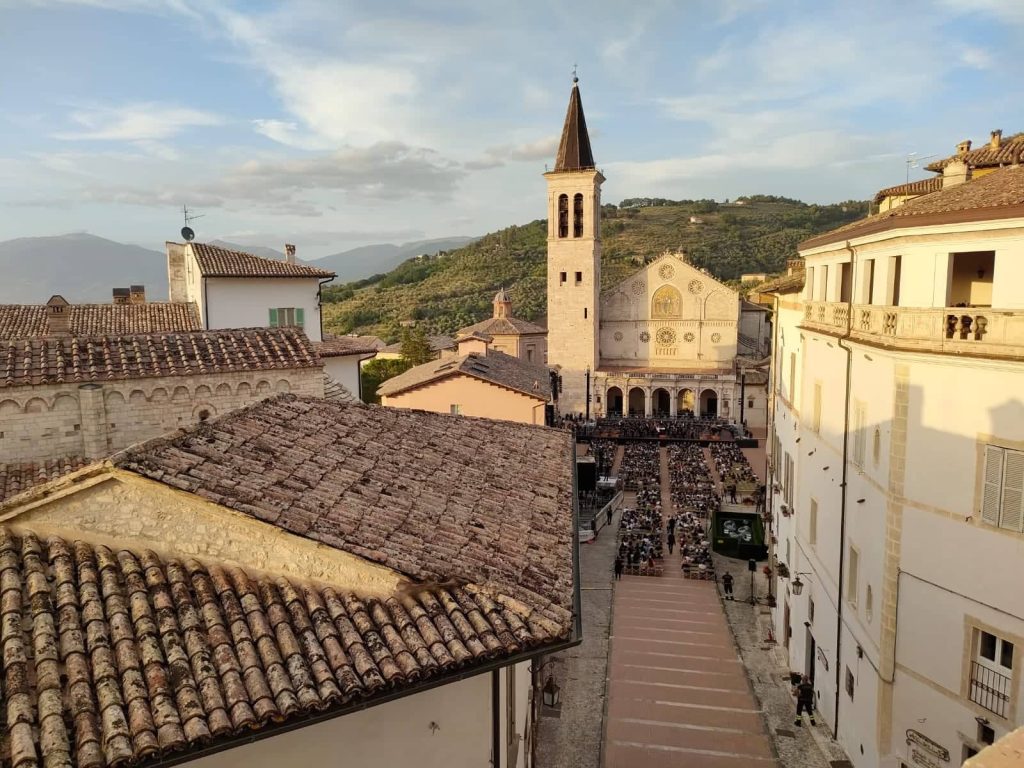
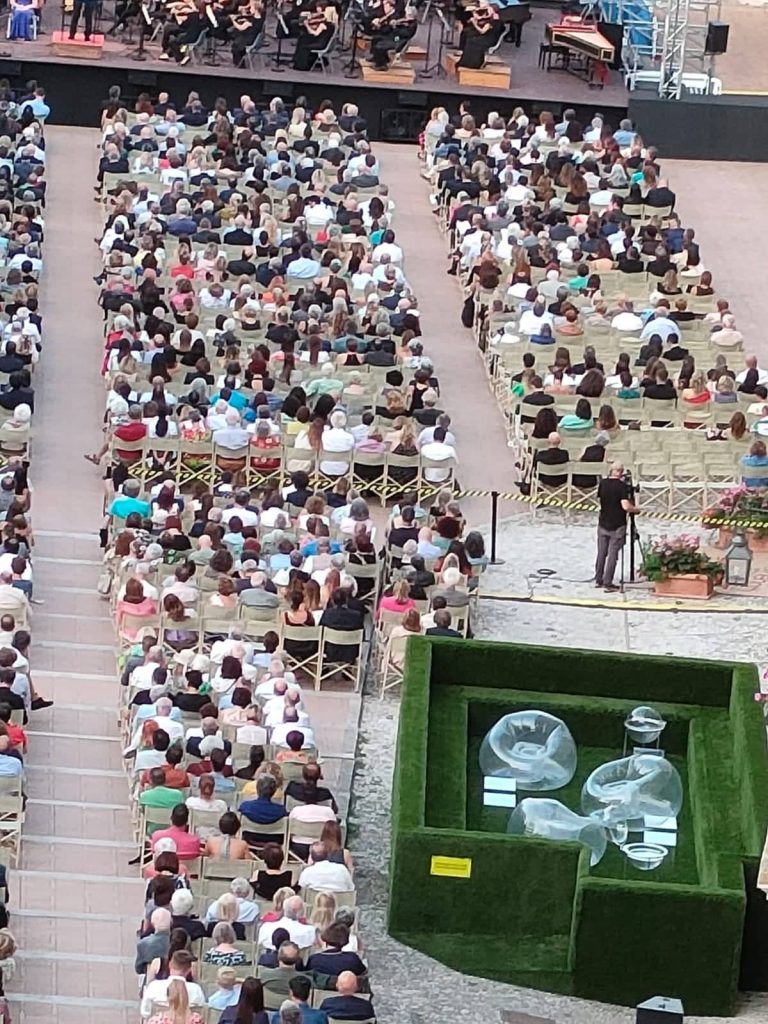
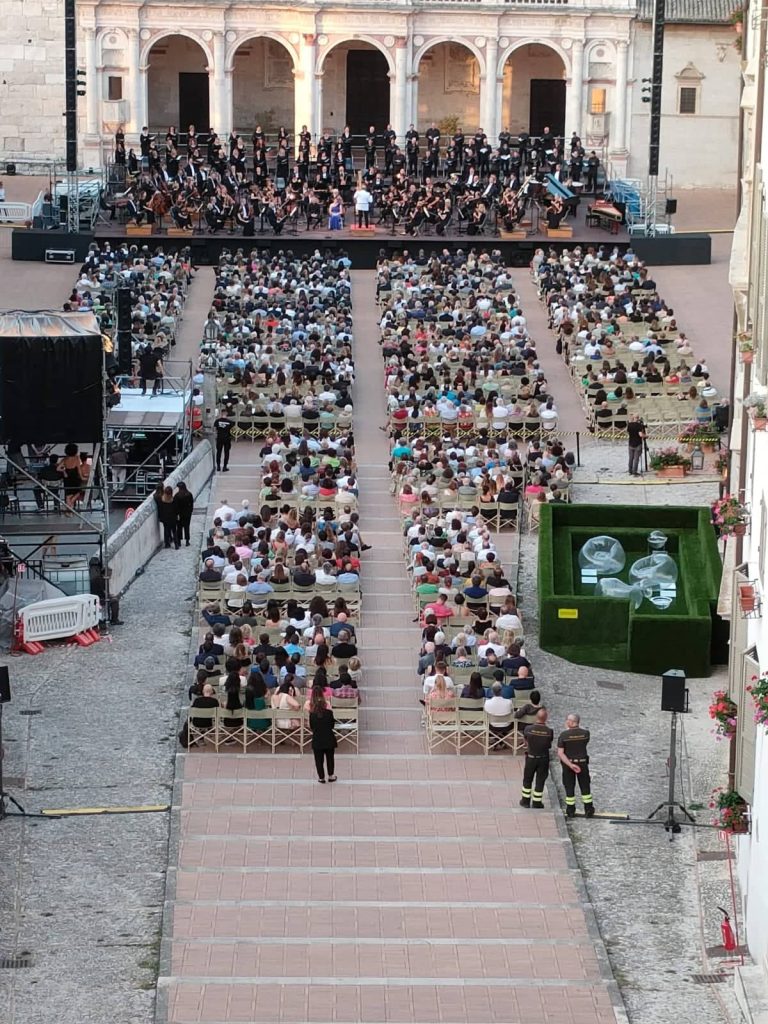
Then, for heaven’s sake, photos can be taken in many ways, including those that cover the gaps and stretch the heads out of all proportion. But“There nisciuno is fool! (Totò always said it – Official photos of the Festival dei Due Mondi)
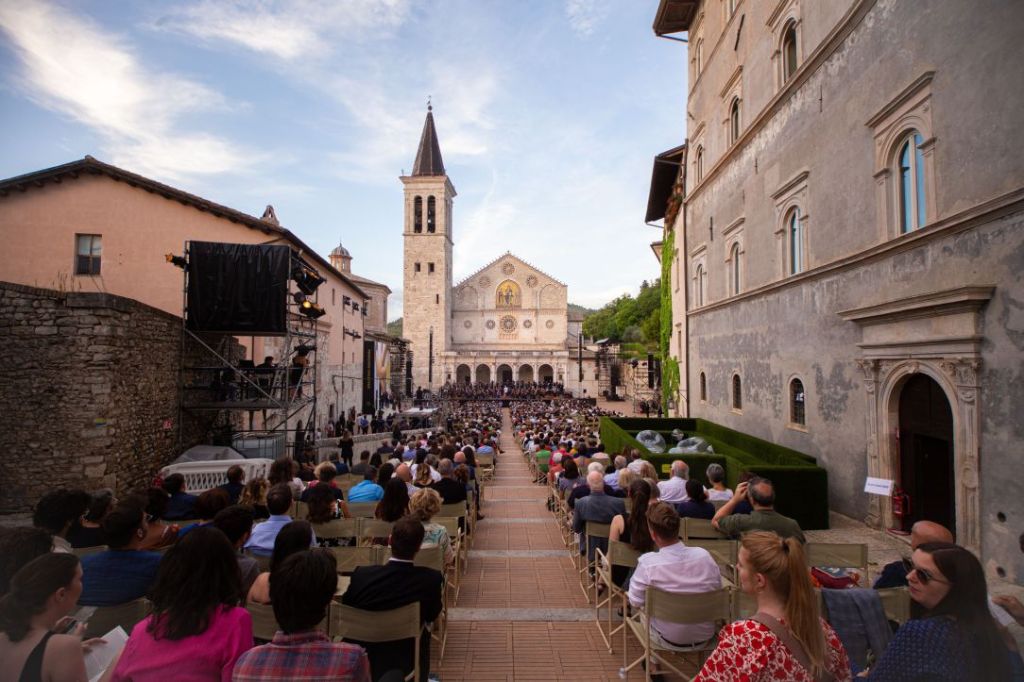
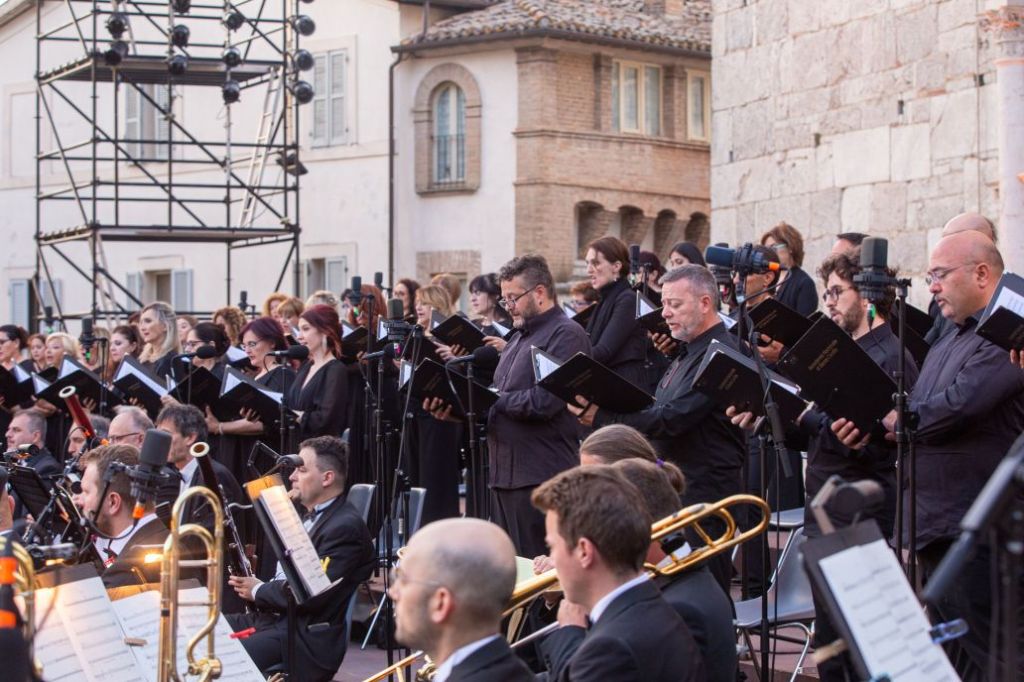
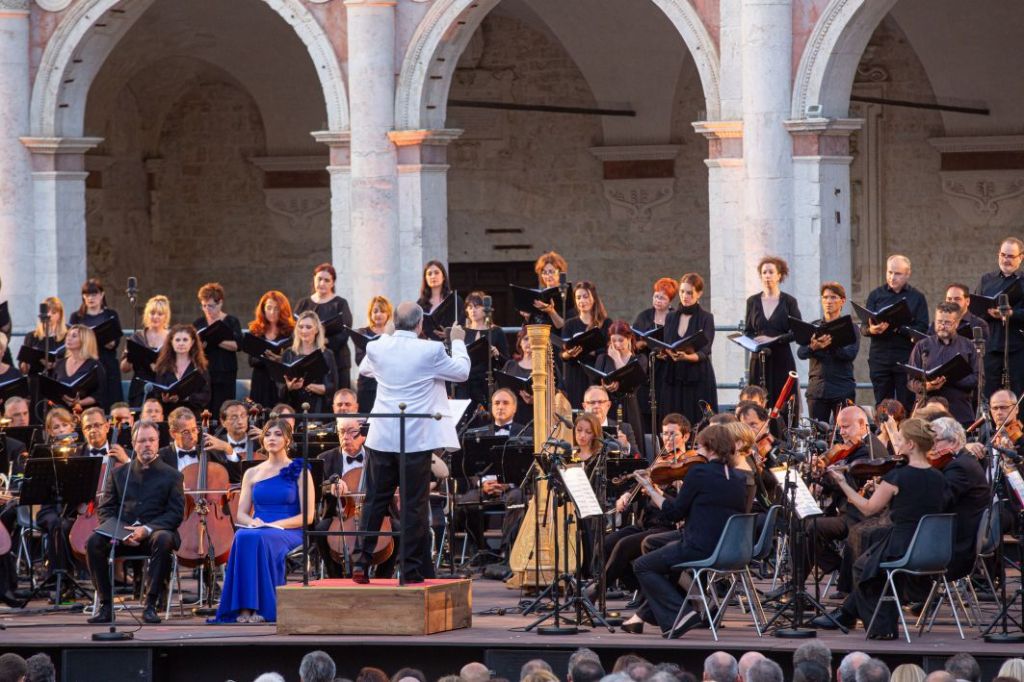
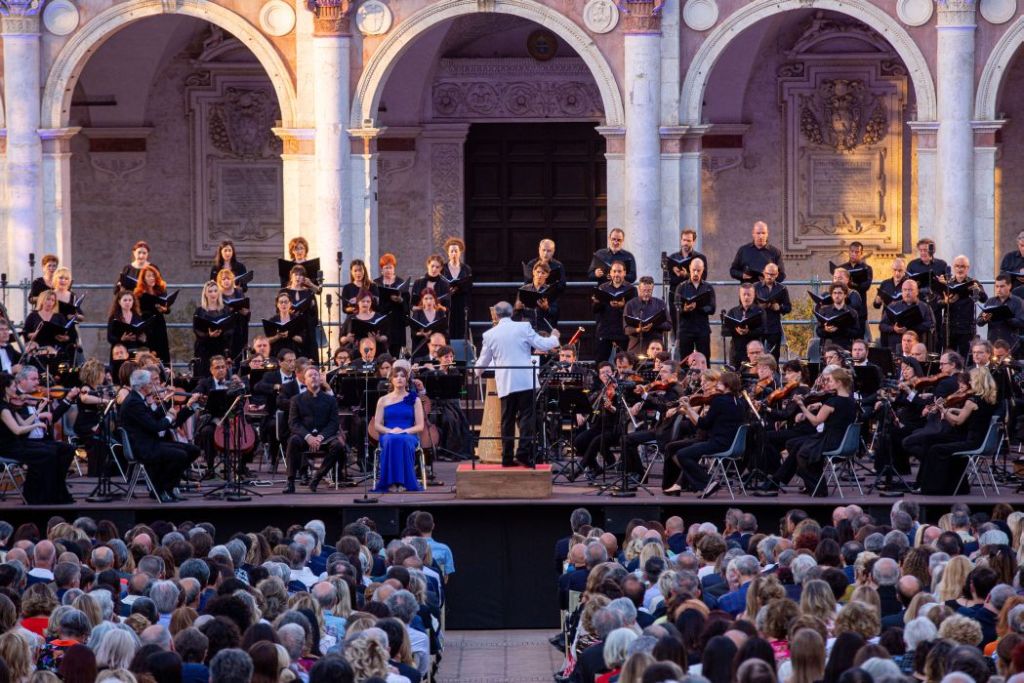
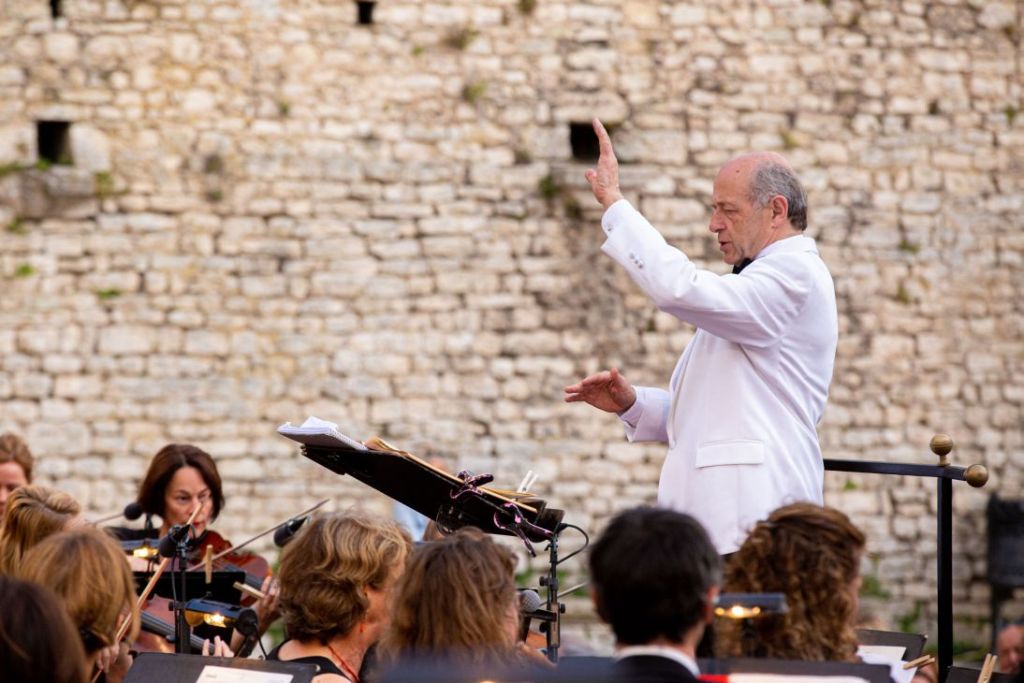
And if someone wants to let us know yesterday’s paying admissions in Piazza Duomo, net of invitations, gifts, gifts and simple generous donations, the world of information will be grateful. In the meantime, we limit ourselves to registering a figure of around 1300 seats registered on the map and gross of the extras mentioned above, and always with the benefit of the inventory and ready to rectify (the Press Office of the Festival is very meticulous on this).
For the moment we limit ourselves to recording some facts (these verified in presence) in the filling of the others shows-Before of 24. The most sensational would be that of San Simone (Le crocodile Trompeur) where in the face of a capacity of 120 seats, it seems that it has remained below the 60 presences. Difficulty, at least in the first moments of the show, to wait before Le Sacre du Printemps, where the public would arrive in dribs and drabs after the end of the concert in Piazza Duomo which began with a certain delay.
Same situation of missing filling in the first de The rendezvous, or rather the story of a jewish cock where, for the title alone, a certain scandalous chatter had arisen. Of 110 available places it seems that there was a filling of just over 50%.
No problem for Le Bal de Paris by Blanca Li who, also thanks to the fruition formula that provides for groups of about ten people at a time, has had a constant influx. And this also for the 12 o’clock concerts with music by Menotti.
What could be the reason for such an unpacking of primes is not known and we fear will remain a glorious mystery.
But the choice to perform the Phlip Glass Oratorio remains a courageous and guessed choice. Too bad the tafazzismo to mortify her alone.
After all, you can always try again!

